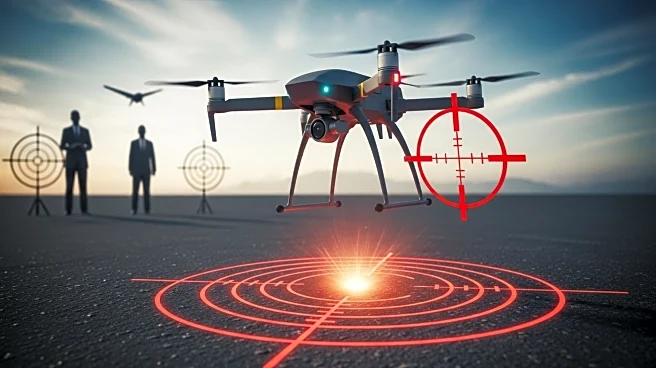What's Happening?
The Israeli Defense Forces (IDF) have confirmed the elimination of Hudhayfa al-Khalti, also known as Abu Obeida, who was the head of Hamas's propaganda department. This action is part of a broader strategy by the IDF to target Hamas leadership, with a focus now shifting to leaders residing abroad, particularly in Qatar. The IDF has been supporting anti-Hamas militias in Gaza and has intercepted a drone smuggling weapons from Egypt. Schools in Gaza border communities are reopening for the first time since the Simchas Torah attack. The IDF is advancing through Gaza City, encouraging civilian evacuation, and rumors suggest the formation of a Hamas-free zone in Shejaiya. Humanitarian aid efforts continue, with significant resources being directed to southern Gaza.
Why It's Important?
The elimination of Abu Obeida marks a significant psychological blow to Hamas, potentially weakening its influence and morale among supporters. The IDF's focus on Hamas leaders abroad indicates a strategic shift that could impact regional dynamics, particularly in Qatar. The ongoing military operations and humanitarian efforts in Gaza highlight the complex balance between military objectives and civilian welfare. The reopening of schools in border communities signifies a return to normalcy for affected Israeli citizens. The broader implications include potential shifts in international support and diplomatic relations, especially with the United States, as Israel navigates the challenges of achieving its military and political goals.
What's Next?
The IDF plans to continue its operations in Gaza City, with 50,000 reservists reporting for duty. The military strategy involves surrounding Gaza City and conducting raids to pressure Hamas. Prime Minister Netanyahu and the government are against a partial hostage deal, preferring a complete disarmament of Hamas. The IDF's actions may lead to a prolonged occupation of Gaza, affecting both military resources and international relations. The situation remains fluid, with potential changes in strategy depending on the outcomes of ongoing negotiations and military engagements.
Beyond the Headlines
The IDF's support for anti-Hamas militias and the creation of Hamas-free zones could lead to long-term shifts in Gaza's political landscape. The humanitarian efforts, including water and medical aid, are crucial for civilian survival and may influence public perception of the conflict. The IDF's operations in Lebanon and Yemen indicate a broader regional strategy that could affect geopolitical stability. The threat from the Houthis and increased security measures around Israeli leaders highlight the ongoing risks and challenges faced by Israel in maintaining national security.










